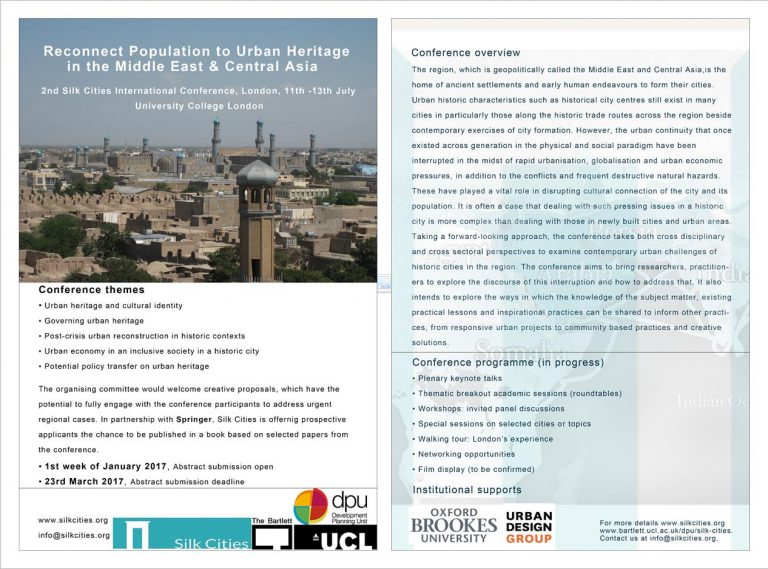Reconnect population to urban heritage in the Middle East & Central Asia
- 2nd Silk Cities International Conference
- UCL, 11-13 July 2017
Co-organisers
Institutional Support
Conference Overview
Cultural heritage, in essence relate to both physical and social sciences. It intertwines with identity and connection to the world where culture is still seen in its concrete manifestation of expression in the physical space i.e. built environment as well as in its observance of social values, experiences, connection in its intangible dimension Urban cultural heritage, relates to urban elements (urban morphology and built form, open and green spaces, urban infrastructure), architectural elements (monuments, buildings) and community rituals and ceremonies, rooted in their histories and values.
The region, which is geopolitically called the Middle East and Central Asia, is the home of ancient settlements and early human endeavours to form their cities. Urban historic characteristics such as historical city centres still exist in many cities in particularly those along the historic trade routes across the region beside contemporary exercises of city formation. However, the urban continuity that once existed across generation in the physical and social paradigm have been interrupted in the midst of rapid urbanisation, globalisation and urban economic pressures, in addition to the conflicts and frequent destructive natural hazards. These have played a vital role in disrupting cultural connection of the city and its population. It is often a case that dealing with such pressing issues in a historic city is more complex than dealing with those in newly built cities and urban areas.
Taking a forward-looking approach, the conference takes both cross disciplinary and cross sectoral perspectives to examine contemporary historic cities in the region. The conference aims to bring researchers, practitioners to explore the discourse of this interruption and how to reconnect population to their urban cultural heritage in the Middle East and Central Asia. It also intends to explore the ways in which the knowledge of the subject matter, existing practical lessons and inspirational practices can be shared to inform other practices, from responsive urban projects to community based practices and creative solutions. The Conference envisions a high profile publication based on a selected number of papers.

